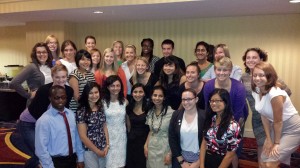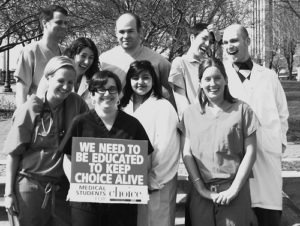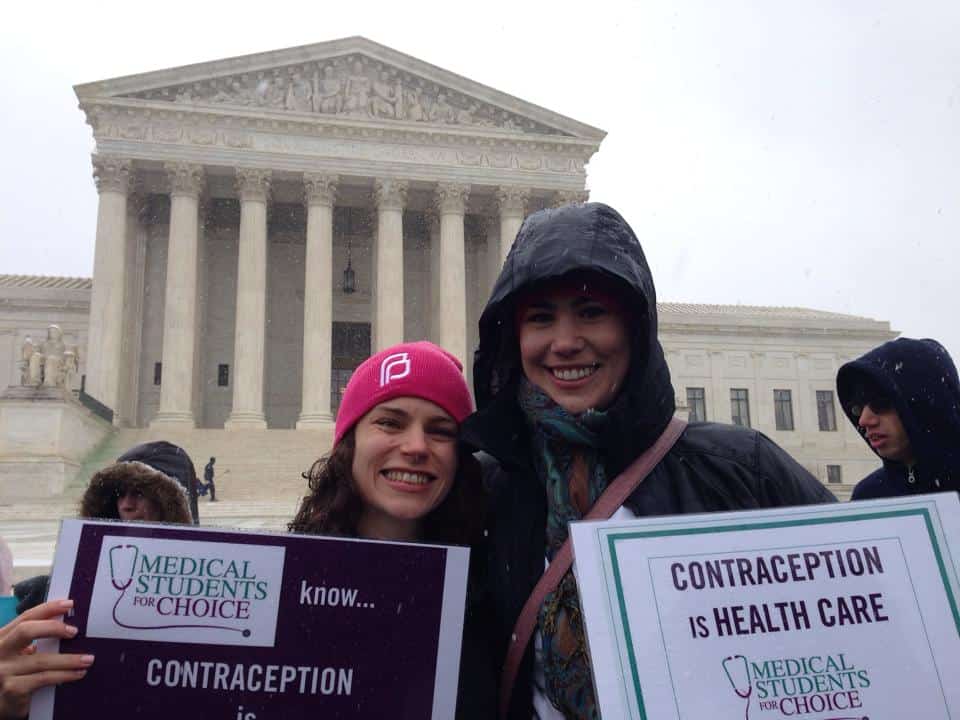By Felipe on October 14th, 2014. Posted under: News and Views
Emily, a second year medical student, was a participant in MSFC’s most recent Abortion Training Institute in Philadelphia, PA. At the ATI, medical students work with reproductive health experts in small-group workshops to learn about abortion and contraception.
Last year, a colleague in my medical school class asked me about the MVA (Manual Vacuum Aspiration, a common abortion procedure) workshop that our school’s Medical Students for Choice chapter had recently hosted. He assured me that he himself was very liberal, but I should know that we had really upset some people in our class.
The room we reserved for the workshop was packed and we had to bring in extra chairs from adjacent classrooms. In the end, we actually had little time for the MVA demonstration because the residents who were leading our workshop took so many questions- about anatomy, about risks, about medication abortion. I think the really upsetting part of the story is actually that medical students in a country where abortion is legal and is one of the most common medical procedures didn’t know the realities of first trimester abortions.
After an entire year of medical education: gross anatomy, embryology, biochemistry, physiology, immunology, I still didn’t have the knowledge or skills to talk about abortion with my fellow students or future patients. This is the reason I applied for the Abortion Training Institute hosted by Medical Students for Choice.
The Institute certainly gave me the information that I needed. I now feel confident describing what occurs in first trimester and second trimester procedures. I am poised to discuss abortion education and access with classmates and faculty. I am better suited to offer options counseling to my patients. The opportunity to have conversations with students and providers from around the country was so empowering.

Medical students gained much needed education at MSFC’s first Abortion Training Institute in 2013.
I am thankful for the honesty with which each of the providers and faculty answered our questions – perhaps we all felt that the topic and our future patients deserved our humility, tact, and openness. My favorite part of the weekend was the opportunity to meet and learn from the medical director of South Wind Women’s Center in Wichita, KS. Her remarks and her career as a provider and advocate for her patients have strengthened my passion for a primary care career.
The Abortion Training Institute solidified my commitment to practice family medicine in marginalized communities and align my practice with anti-poverty work. There is a great need for physicians to provide a full array of reproductive health services. The number of poor individuals seeking abortions is increasing. And the burdens of travel, procedure cost, and wait times are unbearable for those living in poverty. My dream for the future of US healthcare is a single payer system, where everyone has access to full spectrum healthcare, including contraception and abortion coverage.
I am thankful that Medical Students for Choice exists to fill the gaps in my medical education; I encourage others to join the network of students and providers, to use their resources to have workshops on your campuses, and to attend conferences like the Abortion Training Institute. Replacing misinformation and fear with education and understanding is paramount for the future of medical education and the reproductive health of our patients.
By Felipe on October 06th, 2014. Posted under: News and Views

MSFC student activists
In between exams, one medical student in Tennessee took the time to tell MSFC about the chapter at his school, his stance on Tennessee’s proposed Amendment 1, and his plans for his future career.
What drew you to Medical Students for Choice?
I first saw the words “Medical Students for Choice” on the National Abortion Federation’s website at the beginning of my first semester of medical school last year. How I got to that point – searching for pro-choice resources I could use as a medical student – requires a little more background. My father was an Ob/Gyn; he was kind and compassionate, strong and brave. He was an abortion provider. Until his death in 2012, he was the medical director of a women’s health clinic that offered the full range of family planning services. He provided an inspiring and enlightening environment in which to grow up and acted as a role model by standing for his principles and by providing essential services for women in the face of stressful legislation, regulations, and harassment. During my undergraduate studies in philosophy and ethics, I explored my own values at length and this, along with my experiences with my dad, has ultimately contributed to where I am today. Little did I know that these experiences would lead me to find MSFC, and that those four letters would become a regular part of my vocabulary and such a huge part of my life.
What is the atmosphere around reproductive rights like at your medical school, East Tennessee State University?
It really depends where you look. There are certainly students and other members of the school that are not enthused about our presence. There are some that have not expressed an opinion but prefer not to be involved. On the other hand, there are faculty members that have expressed explicit approval and excitement, and there is definitely a student interest. This is our chapter’s second year, and we’ve grown from three founding students to almost 60 members total. Considering that our average class size is 72, I am very proud of the progress our chapter has made. Even with a difference in opinion, there has generally been a very respectful and peaceful response within the school. Is the breakdown and attitude of our school’s population representative of the region of East Tennessee? Definitely not, but we will keep working toward normalizing access to abortion and family planning as regular and responsible parts of women’s health care.
What do you hope to accomplish with your chapter this year?
I think our chapter has been so successful because the of the diversity of our members’ experiences and ideas that moves our chapter forward, and because of our members’ desire to gain exposure and education in a subject that is so important, yet absent from our regular curriculum. So far this semester we have had a values clarification workshop, messaging training for the upcoming “Amendment 1” legislation for Tennessee, and have planned a meeting with a local abortion provider and lawyer. We are also excited to be sending 17 members to the Conference on Family Planning in November. As we progress to the spring semester, I am hoping we will have some more great meetings and prepare future Student Leaders to take on the chapter next year.
Why are you speaking out about Amendment 1?
Amendment 1 (TN SJR 127) is a proposed amendment to the Constitution of Tennessee that states:
“Nothing in this Constitution secures or protects a right to abortion or requires the funding of an abortion. The people retain the right through their elected state representatives and state senators to enact, amend, or repeal statutes regarding abortion, including, but not limited to, circumstances of pregnancy resulting from rape or incest or when necessary to save the life of the mother.”
This is incredibly harmful legislation that has the potential for serious consequences that will negatively affect the health and lives of Tennessee women. Not only is this an invasion of the patient-physician relationship, but it also has the capacity to ease the passage of more restrictive, harmful, and medically non-indicated legislation.
What do you think is the role of medical professionals in advocating for abortion access?
It is important to understand that making abortion illegal or inaccessible does not stop abortions from happening; it does, however, decrease the number happening in already highly regulated, clean facilities by competent providers. Preserving access to abortion is essential to ensuring that basic healthcare needs of women are met in a responsible and safe way that respects women and their decisions without outside intervention. It is absolutely the medical community’s responsibility to advocate for access to services that are simply regular parts of responsible, compassionate, and comprehensive reproductive healthcare.
What are your hopes for your future medical career?
I am planning to pursue a career in obstetrics and gynecology and provide comprehensive reproductive healthcare somewhere in the Southeast. Ideally, I would love to go to a residency outside of the South that has a Ryan program, continue to a fellowship in family planning, and make my way back home. What that means exactly, I am not entirely sure; a lot depends on laws, restrictions, and politics at the time. It may be that I can live close to where I work, or I may have to regularly travel to provide the care that is needed. Either way, I am dedicated to serving where I can help. If feasible wherever I end up, I would really like to work with medical students and residents to help educate future providers. Without trained providers, there is no choice.
The views, positions, and opinions expressed by the author are his alone, and do not necessarily reflect the views, positions, or opinions of ETSU and Quillen College of Medicine or any employee thereof.
By wpengine on July 11th, 2014. Posted under: News and Views

MSFC members making their voice heard in Washington, DC in March despite the weather!
I’m angry. But more than that, I’m worried. I’m worried and I’m deeply disturbed by the recent, ongoing war on women and our access to healthcare. We’ve watched for the past several years as locality after locality, state after state, and now the Supreme Court of the United States, steadily turn back the clock on decades of hard-won legislative and legal precedents that expanded our rights to health care and our reproductive freedom. What can we do in the face of such injustice?
Last spring, the Supreme Court heard the case Hobby Lobby v. Sibelius. As you may know, several hundred concerned citizens gathered at the Supreme Court to protest against Hobby Lobby and their ludicrous assertion that, (I’m paraphrasing, here), the owners of corporations should be allowed to impose their religious beliefs upon all of their employees. In this particular case, the Hobby Lobby owners wanted, (and were recently granted), legal authority to deny their female employees access to health insurance coverage for birth control.
So, on March 25, I stood on the wet, snowy steps of the Supreme Court with several of my medical school classmates representing Medical Students For Choice. I think that protesting at the Supreme Court has a negligible effect on the outcome of cases, but I went because, as an American woman, I wanted to stand with like-minded citizens to say, “This is wrong. My healthcare is #notmybossbusiness. Medical decisions belong in the clinic, between a doctor and her patient. We are appalled and we want the world to know it.” I went because, as a medical student and future doctor, I want my patients to know that I’ve got their backs. I want patients to know that I will use my position of relative influence to advocate for them in all their healthcare needs. I want them to know that I will fight for their right to take birth control pills, or get an implant or an IUD, or an abortion.
I went into medicine because I wanted to help people. I think that is why most doctors go into medicine. In medical school, though we learn to be compassionate and competent providers of patient care, little emphasis is placed on the larger position we should all assume in our communities and our country. I believe that physicians have a unique role to play in the larger fight for healthcare access. We have unique, first-hand experience with patients’ struggles for access, and our privileged position of relative power obligates us to take this fight and their stories out of the clinic and into the hallowed halls of political power.
I will never stop fighting for birth control. When I become a physician, and I sit down with a patient to say, “let’s talk about your needs and your concerns about your reproductive health,” I want her to be able to choose from all of the medically-sound options, because it really isn’t her boss’s business.

Written by Lillian, a MSFC Student Leader, here with her husband Chris.
By wpengine on June 27th, 2014. Posted under: News and Views

A group of women advocate for legal abortions in 1980. [Evening Standard/Getty Images, source]
Our medical students face different political atmospheres and laws that determine the legality and accessibility of abortion. This January, The University of Texas at San Antonio hosted a panel that included a local clinic staff member and two physicians that provide abortions in Texas. These professionals discussed their experiences in the US before abortion was legal and the current restrictions their practices face now that a restrictive law known as House Bill 2 has taken effect in Texas. The panel is a success for this MSFC chapter because it provided a context for understanding the effects the state’s legal changes are having on medical care.
What does abortion care look like under severe legal restriction?
In looking back on the US pre-Roe (1973), they recalled treating patients who, lacking other options, attempted self-induced abortions in response to unplanned pregnancies.
“Before Roe, the septic ward was where the abortion patients ended up. This is before renal dialysis…patients died of end organ failure a lot of time. They’d get massive pelvic infections, they’d become septic, they had kidney and liver failure and they died; they were young women…you’d ask how these things happened. There was the red rubber catheter, over the coat hanger, that was pushed up there…Lysol, I guess they would inject Lysol into the uterus, those were two very kind of popular things…We saw the septic ones; it was a pretty scary thing.”
“Before ‘73 we did terminations at the hospital…We did them because it was legal if it was to save the life of the mother. We had the psychiatry department rubber stamp those patients’ charts, that these patients were potentially suicidal…”
Things changed when abortion became legal in 1973.
“We really thought, when we opened the clinic, that maybe, maybe it would take a year. But that would be all, because doctors would incorporate [abortion] in their practice…To think, here we are 41 years later and that hasn’t happened…”
Abortion still hasn’t entered mainstream medicine education and practice. Politicians have been increasingly chipping away at women’s constitutional right to abortions by passing laws such as HB-2 in Texas that place unfair restrictions on abortion providers. What does abortion care look like under severe legal restriction?
One provider lost his partner in practice because he wasn’t able to get admitting privileges at a hospital. Another no longer feels comfortable prescribing medical abortions because patients are mandated to take the pill in front of him and are likely to abort on the way home if their drive is longer than 2 hours. All providers are affected by the changing reproductive health landscape in Texas, and all expressed worry that some other states are trying to follow suit.
“When a patient comes for an ultrasound…we have to follow a script.We have to say, ‘I am required to say this by Texas law’… My job isn’t to change her mind; my job as a physician is to provide safe, adequate care for that woman, and then here I am having to explain to this woman where the embryo or fetus is in its development, and if there’s a heartbeat…”“Here’s what is happening on the border now: women are getting Cytotec (misoprostol)… People are going to Mexico or finding it on the street…The problem is, a lot of women aren’t accurate in terms of how far along they are…if you are at 14 weeks and you think you are at 6, and you go and take Cytotec, that could be a huge problem… [Pharmacies can] give it to you but they don’t give you instructions.If you’re less than 9 weeks and you take Cytotec, the correct amount, you have about a 70% of aborting. If you do the whole regimen with Mifeprex (mifepristone), you have about 95% chance of aborting. So women are taking that chance.”
One speaker summarized the situation by reflecting that:
“If we’re going to say ‘It’s difficult to get an abortion’ I think we’ve got to be able to say, ‘But we’ve got the best family planning programs we can offer you,’ and that certainly isn’t what has happened in Texas.
This thought-provoking session reflects on practicing medicine in restricted settings that we see mirrored globally. What would a panel on local legislation regarding reproductive health look like in your country and your community? What can medical students do to facilitate safe and legal abortion provision around the world?
To ensure that women receive the full range of reproductive health care choices, Medical Students for Choice fights to make reproductive health care, including abortion, a standard part of medical education and residency training.
By Felipe on March 13th, 2014. Posted under: News and Views
ETSU Evening with an Abortion Provider
MSFC’s chapter at Eastern Tennessee State University recently held a hugely successful event in an area that is often more hostile than hospitable to pro-choice activities. We talked to Aaron, an MSFC student leader, to hear more about how he set up the event, why it was such a success, and what he suggests for other student leaders who’d like to plan something similar.
What was the event?
Yesterday we had a “Meet the Doctor” event, and it was absolutely fantastic. We met off campus at a local restaurant. The physician knows the owner of the restaurant, and working with him we were able to host 24 students plus the physician completely free of charge to both the physician and our chapter.
The physician ended up speaking for about half an hour on his experiences through medical school and how he got to where he is today, and shared several examples of why it is necessary that we keep choice alive. Following his talk, the chapter members proceeded with about half an hour of questions, at which point he had to take a break just to eat!
How did you set it up?
My father was an abortion provider until his death in June 2012. Since then, I have kept in close contact with the employees of the clinic at which he served as medical director; it was through these connections that I was able to first speak with the physician last semester. We kept in touch, and in January I asked if he would be interested in speaking to the chapter on February 19th.
What did people like about it?
“One element of [the doctor’s] story that really stuck with me is how he handles the difficulties of being an abortion provider in one of the most conservative areas of the country with apparent calmness. It sounds as though the support of his loyal patients and the encouragement of a few fellow physicians almost make [the doctor] immune to the terrible tactics employed by the anti-choice protestors outside his office. It made me feel that if he can provide abortions comfortably in this area of the country, than I certainly could provide abortions anywhere I may end up.” – Tatiana
“Our speaker stressed the importance of abortion training to prevent additional harm to the mother in the case of a miscarriage. This further validated my support for widespread education on this subject for all OB/GYN professionals.” – Faith
“There are more of my classmates open to these issues than I expected. I was impressed at how many people came and how respectful they were during the discussion. We all had a lot of good questions and it was a wonderful dialogue…I think being in a restaurant, like you would do with friends, made people comfortable and open. Giving out the details of the event after getting responses of interest ensured that all the people there were going to be open to the conversation and made those in attendance feel they wouldn’t be judged by their peers.” – Katie
“I really enjoyed seeing my classmates start to think deeper. Some were getting riled up about all of the frustrations that come with being an abortion provider. They were frustrated to learn about all of the hurdles a woman faces to receive services, but they were also getting fired up to do something about it. It was really exciting to see the wheels turning in their minds.” – Becca
I personally realized what a tremendous effect a provider can have on the education and passion of the members of a chapter of Medical Students for Choice. If there were one program or meeting I would have again next year, it would definitely be speaking with the physician. I could spend hours finding stories of harassment by protestors or of scenarios where people might almost universally agree on a woman’s decision to seek an abortion, but nothing I would find would ever be able to measure up to hearing a reproductive health expert elaborate on his/her personal and professional experience and anecdotal stories. This, I think, invigorated the members and added excitement to reproductive health advocacy more than anything else we have accomplished this year as a new chapter.
Tips for interested Student Leaders?
My advice for other students leaders looking to set-up something similar would be to first seek out reproductive health experts – physicians, other health care providers, and non-healthcare advocates – that would be close-by and available enough to meet with your chapter. Many providers and advocates are more than happy to help out and speak at an event like this, but it may just take some work finding the right person for the program. I was originally planning on hosting the physician on the College of Medicine campus, but we were lucky in that he was able to help out with the meeting location and resources. It is also helpful to know that for future meetings, we found a fantastic restaurant that is willing to host our group.
I think the members of our chapter really enjoyed meeting off-campus and in the casual setting of a restaurant. It was also beneficial that we had completed a two-part series on the “Values Clarification Workshop” from NAF that we originally encountered at the Conference on Family Planning in Denver.
By Felipe on February 11th, 2014. Posted under: News and Views
On February 7, 2014 in Washington, DC, the Coalition for Liberty & Justice convened a forum featuring legal and political experts, religious and community leaders, grassroots organizers and advocates for religious freedom and against discrimination.
Our Executive Director Lois Backus spoke on the panel for Women’s Rights and Religious Liberty. See the schedule and access a link to a recording of the forum here:
http://www.catholicsforchoice.org/campaigns/CLJ/CoalitionforLibertyJusticeForum2014.asp
By Felipe on February 07th, 2014. Posted under: News and Views
By the time I got to the Planned Parenthood clinic to begin my Reproductive Health Externship I’d seen about a dozen first trimester abortions at a private clinic close to my school. “No sweat,” I convinced myself, remembering how underwhelmed I’d felt the first time I saw the procedure. To my surprise there was no great epiphany, no anxiety at seeing a ruptured gestational sac sitting in the backlit glass pan, no knee-jerk morality of disgust creeping in, nada. All that was left was plenty of time to wonder about what the woman was planning on doing now that she wasn’t pregnant anymore: “Day one of the rest of her life,” as many providers said.
However, while observing the first few procedures in my RHE with a wonderful provider and teacher who’d taken me under her wing, suddenly the focus shifted. Outside the OR, she picked up the patient’s folder, turned to me, slammed it into my hands. The quarter inch thick manila patient file looked and felt like an anvil dropped by Wiley Coyote, my confidence pancaked beneath.
When I started medical school, I knew I wanted to be involved in abortion care and reproductive health rights. I didn’t realize how quickly (and happily) I’d be swept up into the pro-choice world via our local MSFC chapter. When I went to the national Medical Students For Choice conference in second year, I wanted to meet other pro-choicers, learn from providers, and learn from students; I had no grand expectations. I also didn’t realize that just by asking questions during the sessions I’d land a direct RHE mentor’s invitation.
Procedural Notes
Back in that OR, I was sweating as I failed to fit into a pair of medium sized gloves, knowing I was already slowing the flow for the PP staff (keep a close eye on those large boxes of gloves, future male providers of America). What happened next? I was taught thoroughly, step by step. No sighs of frustration from my provider-educator like I’d come to experience during my surgery rotation.
That first night I went back to where I was staying, and over a well-deserved beer, pasted a PP sticker into my journal that read “We Are Planned Parenthood.” Feeling on top of the world, I crossed out the “We Are” and wrote “I Am.” I felt empowered, finally. No more ego beatings by exams, no more memorizing lists of things only not to be asked about them, but instead real questions from my physician-educator that were relevant to the care of real people. And there was work. Wonderful, life altering, empowering, gritty, dirty, and ultimately cleansing, work. It resulted in no more anxiety inside her head. No more unwanted masses of cells or organs sucking her steadiness and her future away.
That feeling of sheer terror during the first handful of cases faded, and turned to concentration, which turned to concentration sprinkled with enjoyment. Plus, now having worked with or observed five different providers, I’ve picked up different lessons and tricks from each. I obviously have many more cases to do before I’m a proficient provider, but I’ve already begun a few habits I know I’ll keep with me. One is checking in in the recovery room with each patient just to say hi and ask how they’re feeling. They’re usually pretty drowsy, but when they deny any bad cramping, give me a big thumbs up and flash a smile, my own anxiety becomes the pancake beneath anvil of satisfaction that I’ve rarely ever felt in any aspect of my life. It’s a very difficult time for some women, and when I’d occasionally have one that would lean over, sleepy eyed, and tug at my scrubs just to say “thanks” as I exited, I was thrilled. (It’s worth mentioning that in my experience, not even most women appear to be in distress, so this has become a myth I’d like to dispel. Most women are far stronger than even they give themselves credit for.)
Lying To Return
At this year’s MSFC National Conference on Family Planning I was surprisingly and happily adorned with an “Extern” ribbon on my nametag along with others who’d done the RHE, and it proved to be more question-tropic than I’d expected. I aggressively spread the good word like an evangelist spirit finally dropped into the right body. Indeed, my feelings about the RHE can be summed up in the following fact: Though I’d already seen the 50 required medical and/or surgical abortions, I lied. My provider-educator asked “so will we see you again? I know it’s a long drive for you, especially on the weekend. Are you done with the RHE?” “…Naw, I’ll have to see y’all a few times this fall to finish up.” Return I have, and return I shall. Plus, to ensure the experience continues, it’s a favor I’ll be paying forward. Indeed in a small way I already have: in the wake of my experience, I gave a lunch lecture on surgical and medical abortion methods which was wonderfully well attended, an event I hope every RHE’er does at their school. Lastly, if you’re a pre-med and reading this, perhaps one day you’ll get to have me patiently looking over your shoulder just as I was taught. And then you’ll pay it forward, just as you’re taught. The circle will continue and spur growth everywhere, from family practices to other private clinics, Planned Parenthoods, and hopefully into hospitals. The RHE helped normalize and demystify abortion for me, and I will help normalize abortion education for as many others as I can. I look forward to seeing you in the clinics!
-Will, 2013 MSFC extern
By Felipe on January 31st, 2014. Posted under: News and Views
A short film about humans, choice, and frogs was re-released this year. It is simple, accurate, and a little cheeky. It serves as a pretty good reminder of why pro-choice organizations and individuals must be proactive.
Watch here: http://lifeliberty.net/
By Felipe on January 27th, 2014. Posted under: News and Views
As we celebrate the decision that negated any laws restricting the practice of abortion in Canada, we’d like to share some facts with you about the history of choice in Canada as well as the current accessibility. It’s important that we train the next generation of abortion providers and make abortion even more available to women!
View and download our factsheets here:
By Felipe on January 22nd, 2014. Posted under: News and Views
In addition to celebrating the decision that decided the legality of abortion in the US, we’d like to share some facts with you about the availability of abortion in the United States and why it’s important that we train the next generation of abortion providers and keep fighting to keep abortion safe and legal!
View and download our factsheet here: Roe facts 2014




